MD2PDF | Feb 13, 2023
Introduction
Welcome to my another writeup! In this TryHackMe MD2PDF room, you'll learn: Exploiting PDF generator, SSRF (Server-Side Request Forgery) and more! Without further ado, let's dive in.
- Overall difficulty for me (From 1-10 stars): ★☆☆☆☆☆☆☆☆☆
Table of Content
Background
TopTierConversions LTD is proud to present its latest product launch.
Difficulty: Easy
Hello Hacker!
TopTierConversions LTD is proud to announce its latest and greatest product launch: MD2PDF.
This easy-to-use utility converts markdown files to PDF and is totally secure! Right…?
Service Enumeration
As usual, scan the machine for open ports via rustscan!
Rustscan:
┌[siunam♥earth]-(~/ctf/thm/ctf/MD2PDF)-[2023.02.13|17:39:52(HKT)]
└> export RHOSTS=10.10.23.90
┌[siunam♥earth]-(~/ctf/thm/ctf/MD2PDF)-[2023.02.13|17:39:58(HKT)]
└> rustscan --ulimit 5000 -b 4500 -t 2000 --range 1-65535 $RHOSTS -- -sC -sV -oN rustscan/rustscan.txt
[...]
PORT STATE SERVICE REASON VERSION
22/tcp open ssh syn-ack OpenSSH 8.2p1 Ubuntu 4ubuntu0.5 (Ubuntu Linux; protocol 2.0)
| ssh-hostkey:
| 3072 383467947befbc164e461f6f15c5b814 (RSA)
| ssh-rsa AAAAB3NzaC1yc2EAAAADAQABAAABgQDnD7lBp26CwEmGpb1+K0Gu4JxqOT84igkOLGM/T7UFJCpjemg5lnFUK1aoD35ZvtdRRaikudWKurUkL7HJOjZfnf5RRH9I+NYhbJtUBP1ST4GE5BzlYfTmlQKa2tCo9b7wXLYj5AcT6Q9lC0QQ5qVhDclKUTeOxvKWEyeRj7/CcxILWRjb8e+xaz+Z5W/bu3viihyUxWyzlIWW6aafWpXOYIgK+CeLJ68uArMeY2eSX4WnL3NlbM/Gh8/m/TaZr81h3WQQdek59avYxH82QbaopNWV53JBvvT5OJMwO5YYPhk1OH+J8CqDSjFHJi14tpON4xow18Xfc7Nf5h2pKghvltnpnGvkhVDOpxg0H3R3nT7ClB5nNlmIKOT1GjbENp2sgtNEP0RWuH7kKa5EwxbXTBIDWlOKJSRGJ6jqa+9P9RD9DmbeiZJQWxTgZuuv2aocdGpNgcD3sN9WNa/N3HAbrkaRyNoiZ46juFM8pMWjr2aFCl1tjlXRjMXZ0LraQ+E=
| 256 4b7d925352b3bb5d1a22bbb8b0c00797 (ECDSA)
| ecdsa-sha2-nistp256 AAAAE2VjZHNhLXNoYTItbmlzdHAyNTYAAAAIbmlzdHAyNTYAAABBBM9WqdD9tCKaRX9krGCQaOst8PjsbR7yAWzmK5Dsf5RGy2nS0FAhggq8cYAx0IVP1nAPc+YX9/iCGwV+N0nUH3E=
| 256 bf695439bf5168324b2b984ed5a8b3c5 (ED25519)
|_ssh-ed25519 AAAAC3NzaC1lZDI1NTE5AAAAILomzRONv0mJvluQPxlebU6npuplJzP6m6p09buBtX76
80/tcp open rtsp syn-ack
|_rtsp-methods: ERROR: Script execution failed (use -d to debug)
| http-methods:
|_ Supported Methods: HEAD OPTIONS GET
| fingerprint-strings:
| FourOhFourRequest:
[...]
|_http-title: MD2PDF
5000/tcp open rtsp syn-ack
|_rtsp-methods: ERROR: Script execution failed (use -d to debug)
| fingerprint-strings:
| FourOhFourRequest:
[...]
Service Info: OS: Linux; CPE: cpe:/o:linux:linux_kernel
According to rustscan result, we have 3 ports are opened:
| Open Port | Service |
|---|---|
| 22 | OpenSSH 8.2p1 Ubuntu |
| 80 | HTTP |
| 5000 | HTTP |
HTTP on Port 80
Adding a new host to /etc/hosts:
┌[siunam♥earth]-(~/ctf/thm/ctf/MD2PDF)-[2023.02.13|17:46:31(HKT)]
└> echo "$RHOSTS md2pdf.thm" | sudo tee -a /etc/hosts
Home page:
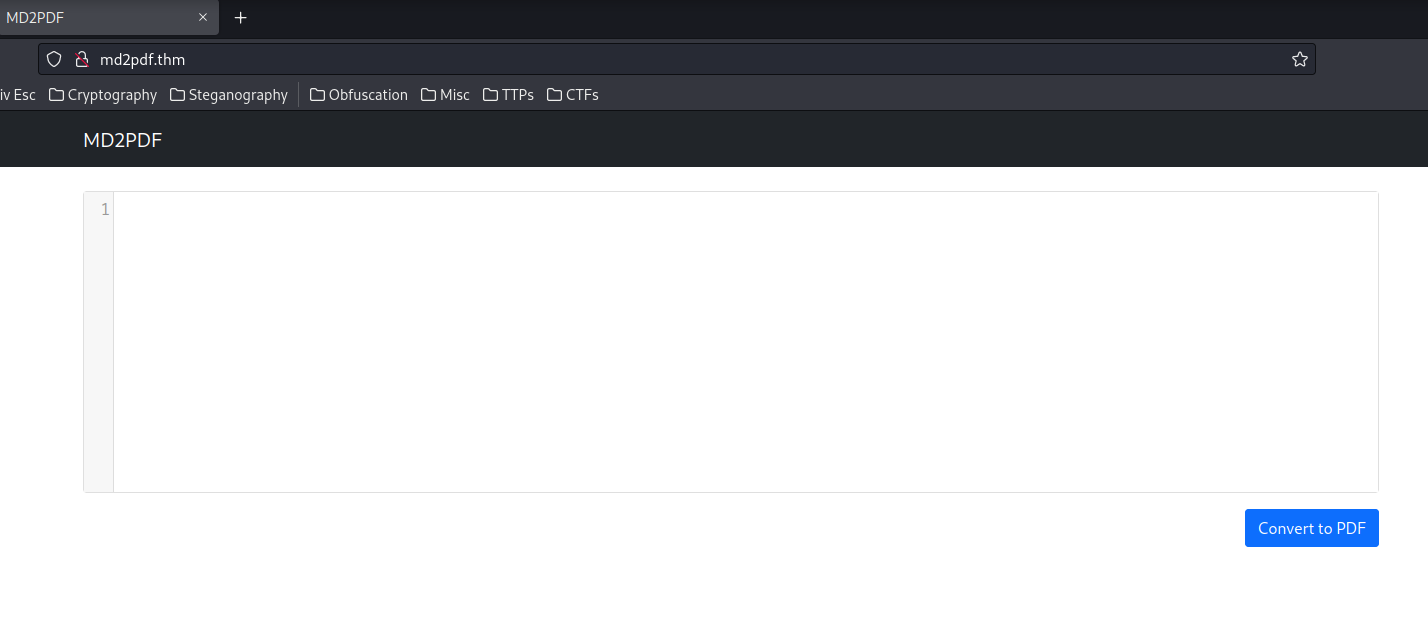
Hmm… Markdown to PDF?
View source page:
[...]
<script>
$(document).ready(function () {
var editor = CodeMirror.fromTextArea(document.getElementById("md"), {
mode: "markdown",
lineNumbers: true,
tabSize: 2,
lineWrapping: true,
})
$("#convert").click(function () {
const data = new FormData()
data.append("md", editor.getValue())
$("#progress").show()
fetch("/convert", {
method: "POST",
body: data,
})
.then((response) => response.blob())
.then((data) => window.open(URL.createObjectURL(data)))
.catch((error) => {
$("#progress").hide()
console.log(error)
})
})
})
</script>
[...]
Let's try to convert something:
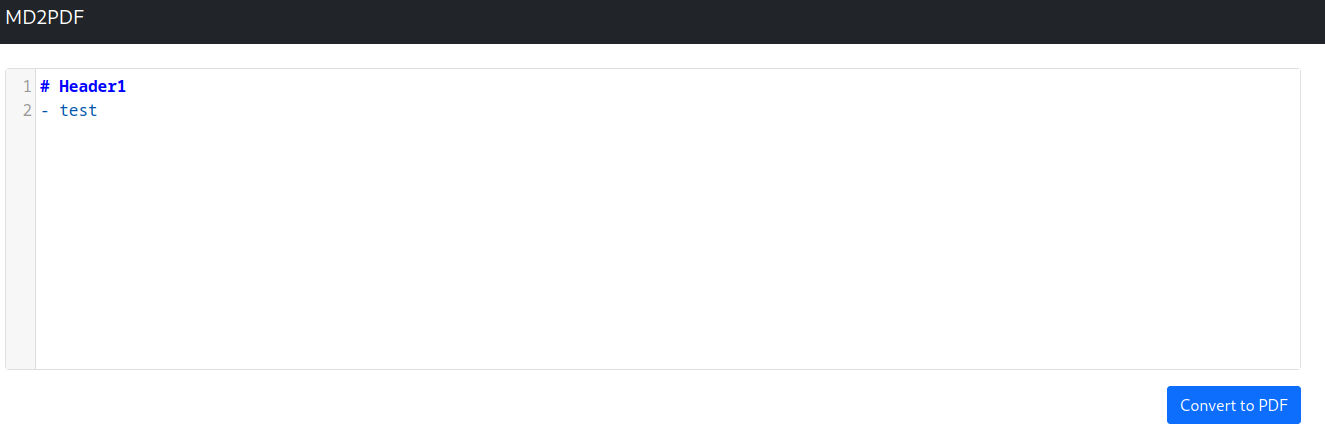

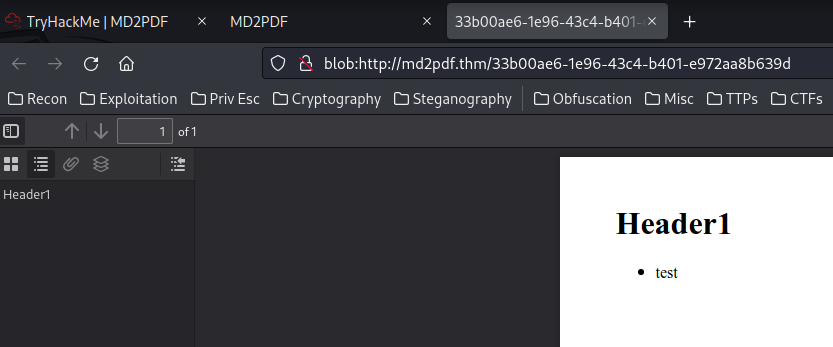
When we clicked the "Convert to PDF" button, it'll send a POST request to /convert, with our Markdown form's data.
Then, when it's process finished, it'll open up a pop up window, with a UUID version 1 link and using blob object instance, which is a a file-like object of immutable, raw data.
Hmm… I remember NahamSec has a tweet that says 99% of all PDF generators are vulnerable to something, like SSTI (Server-Side Template Injection) / CSTI (Client-Side Template Injection), XSS (Cross-Site Scripting), SSRF (Server-Side Request Forgery) and more.
But before we test that, let's enumerate hidden directories and files via gobuster:
┌[siunam♥earth]-(~/ctf/thm/ctf/MD2PDF)-[2023.02.13|18:02:55(HKT)]
└> gobuster dir -u http://md2pdf.thm/ -w /usr/share/seclists/Discovery/Web-Content/raft-large-files.txt -t 100
[...]
┌[siunam♥earth]-(~/ctf/thm/ctf/MD2PDF)-[2023.02.13|18:05:00(HKT)]
└> gobuster dir -u http://md2pdf.thm/ -w /usr/share/seclists/Discovery/Web-Content/raft-large-directories.txt -t 100
[...]
/admin (Status: 403) [Size: 166]
/convert (Status: 405) [Size: 178]
Oh! The /admin route (path) looks sussy:
┌[siunam♥earth]-(~/ctf/thm/ctf/MD2PDF)-[2023.02.13|18:07:18(HKT)]
└> curl -vv http://md2pdf.thm/admin
* Trying 10.10.23.90:80...
* Connected to md2pdf.thm (10.10.23.90) port 80 (#0)
> GET /admin HTTP/1.1
> Host: md2pdf.thm
> User-Agent: curl/7.87.0
> Accept: */*
>
* Mark bundle as not supporting multiuse
< HTTP/1.1 403 FORBIDDEN
< Content-Type: text/html; charset=utf-8
< Content-Length: 166
<
<!DOCTYPE HTML PUBLIC "-//W3C//DTD HTML 3.2 Final//EN">
<title>403 Forbidden</title>
<h1>Forbidden</h1>
<p>This page can only be seen internally (localhost:5000)</p>
Hmm… 403 Forbidden, and it's internal only…
Armed with above information, if we can perform a SSRF or XSS attack to localhost on port 5000, we can bypass the admin panel's restriction!!
Since most Markdown to PDF generators accept raw HTML codes, we can basically inject any HTML codes:

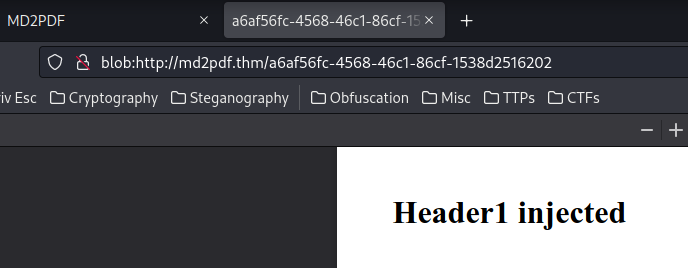
So, it seems like the our injected HTML code is parsed directly to the back-end!
Now, what if I create an <iframe> element, and it's src attribute is set to http://localhost:5000/admin?

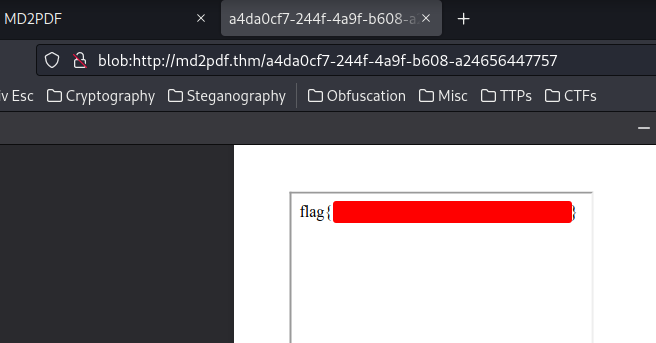
Boom! We successfully bypassed the admin panel's restriction, and got the flag!!
Conclusion
What we've learned:
- Enumerating Hidden Directoreis & Files
- Exploiting Markdown To PDF Generator Via SSRF